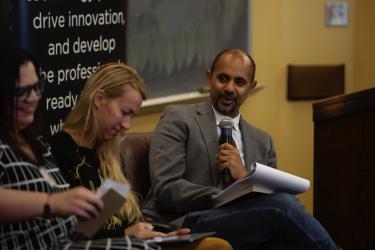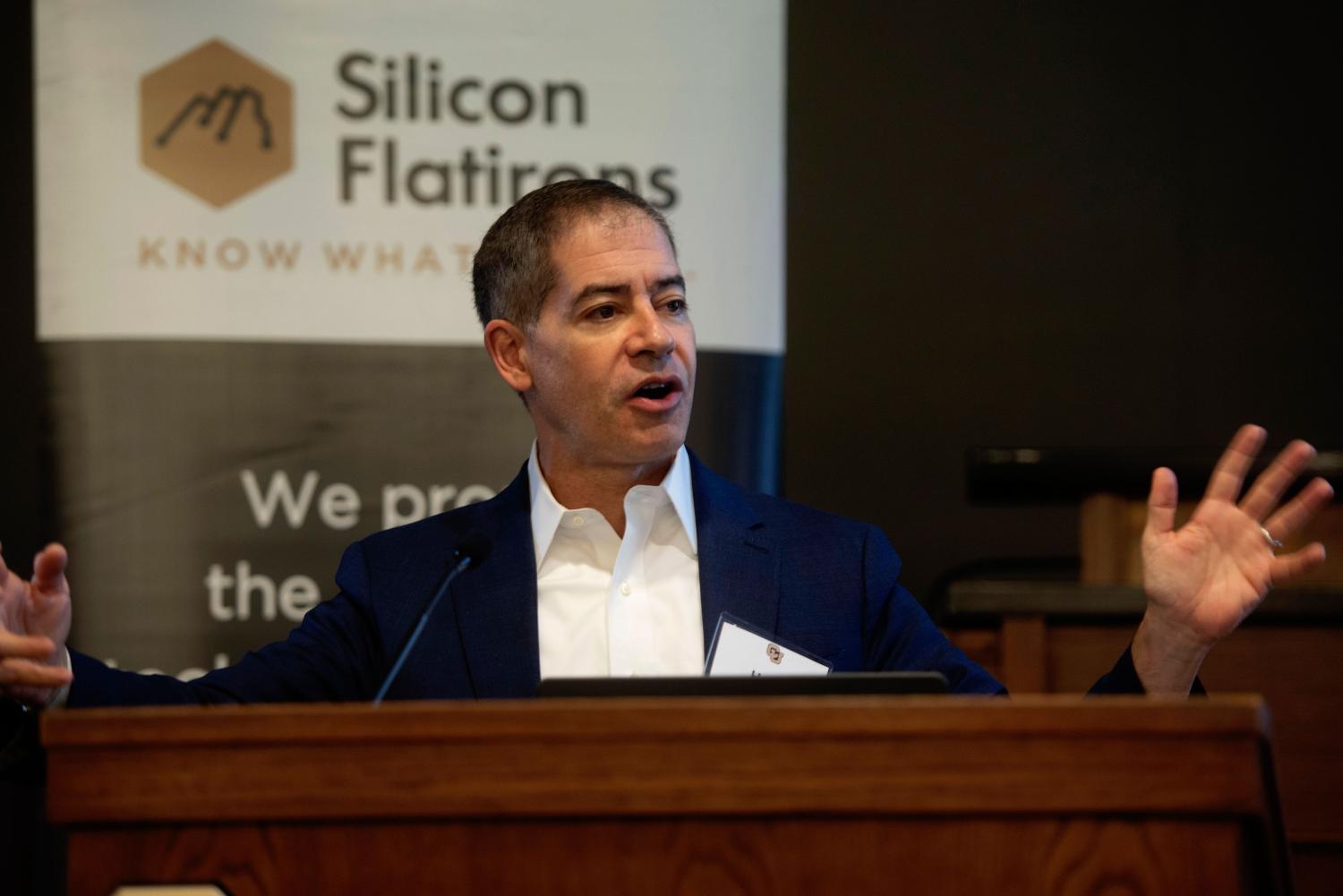Innovating for Impact: Colorado Law at the Forefront of AI and Law
As the future of artificial intelligence (AI) takes shape across the nation and world, Colorado Law faculty and students are helping to shape the future of AI’s application on the law.
Colorado is leading the way. In May 2024, it became the first state to pass comprehensive legislation regulating AI with the Colorado Artificial Intelligence Act. Gov. Jared Polis appointed Professor Margot Kaminski and Associate Professor Vivek Krishnamurthy to the state’s AI Impact Task Force, recognizing their influential scholarship at the intersection of law, policy, and AI. The task force evaluates the law’s application across sectors like education, healthcare, and employment.
Kaminski and Krishnamurthy complement each other’s work in scholarship and practice, pushing the boundaries of how lawyers should approach algorithmic accountability, free speech, and privacy in a digital world.
“It’s a bit of a myth that the law can’t keep up,” Kaminski said. “From narrow AI systems deployed in specific contexts to foundation models, the law is quickly adapting to identify and govern AI harms.”
Widely recognized as a top expert on AI regulation and privacy, Kaminski received a Fulbright in 2024 to conduct research on comparative AI law in the EU. This year, she received Colorado Law's Sandgrund Award for best consumer rights work for her article "Regulating the Risks of AI." Her co-authored piece on the clash between AI and free speech, "From Gods to Google," appeared in the Yale Law Journal. Her scholarship has shaped real-world decisions, with past work cited in the Ninth Nircuit’s 2025 Project Veritas v. Schmidt ruling and the EU Advocate General Opinion in Dun & Bradstreet in 2024.

Professor Margot Kaminski joined fellow privacy scholars and professionals to discuss technology policy at the Silicon Flatirons Privacy at the State Level: An Attorney General’s Perspective on Sept. 17, 2024
Kaminski brings her substantial expertise into the classroom. Last fall, she pioneered the course Artificial Intelligence and the Law, one of the first offered in the country. The course examines the challenges of regulating AI and machine learning in law. Kaminski is currently drafting a first-of-its-kind casebook, Artificial Intelligence Law, along with Professor Paul Ohm of Georgetown Law and Professor Andrew Selbst of UCLA Law.
“I’m so grateful to my students for helping us work through the early draft materials,” she said.
While Kaminski cultivates innovation in her scholarship and the classroom, Krishnamurthy creates opportunities for students to engage directly with AI-related legal issues as director of the Samuelson-Glushko Technology Law and Policy Clinic (TLPC).

Associate Professor Vivek Krishnamurthy engaged discussions among experts at the Silicon Flatirons Feminist Cyberlaw Symposium: Participatory Access and Governance on Nov. 8, 2024.
Last spring, TLPC students submitted an amicus brief to a Florida district court on behalf of three youth organizations in Garcia v. Character Technologies, the first case to consider whether First Amendment protections extend to the outputs of generative AI.
“The brief was a unique opportunity to engage in an urgent legal question with real consequences as an advocate,” said Fynn Fehrenbach ’26, who led the drafting of the brief. “It was the first time I was able to use my understanding of technology, specifically large language models, to work together with the team and help guide the judges to a legal conclusion.”
Silicon Flatirons, the school’s flagship center for law, policy, and entrepreneurship, has long been at the forefront of legal innovation. Founded in 1999 by Phil Weiser, who currently serves as Colorado’s attorney general, the center has hosted more than 400 events exploring emerging technologies and their legal implications.
Recognizing a growing need for legal innovation in generative AI, Professor Harry Surden established the Silicon Flatirons AI Initiative in 2021. A former software engineer and nationally recognized expert in AI and the law, Surden has studied AI and large language models for more than two decades.
“From 2022 to 2023, AI progressed more in one year than it had in the previous five to 10 years,” Surden noted. “That kind of acceleration demands legal innovation.”
Colorado Law and Silicon Flatirons have led national conversations about that innovation. As early as 2019, the center hosted an event on Explainable AI, discussing how to hold machines
accountable. It has regularly hosted tutorials on data privacy law, including the Colorado Privacy Act.
For students like Fehrenbach, the rise of AI is an opportunity to shape the future of law. Last year, he led the AI Initiative for Silicon Flatirons student group, organizing events with experts to discuss the legal and ethical implications of generative AI.
“What makes Colorado Law so great is that the professors are helping shape policy in real time and bringing students along with them,” Fehrenbach said. “Students are at the center of every Silicon Flatirons event. They provide so many opportunities to meet and learn from the top experts in tech and law at a truly state-of-the-art level.”
That momentum continues with the addition of Associate Professor Bryan Choi to the Colorado Law faculty this fall. With a background in computer science and law, Choi brings deep expertise on how legal systems should respond to the rising risks posed by AI technologies. While much conversation about AI centers on job displacement and other uncertainties, Colorado Law faculty emphasize its potential to address one of the legal system’s challenges: access to justice.
“People often worry AI will replace lawyers,” Surden explained. “But the real opportunity is in improving access to justice. We have an enormous gap in legal services, and AI, if used wisely, could help bridge that.”
As AI becomes more integrated into legal practice, Colorado Law is uniquely positioned to lead. Krishnamurthy noted that while technical literacy is helpful, core lawyering skills remain the most valuable.
“You don’t have to be a technologist to be an effective tech lawyer,” Krishnamurthy said. “Skills like logic, reasoning, analysis, and argumentation are more important. You have to know how to think critically and remain conscious of our ethical obligations in a fast-changing world.”
Surden encourages current and aspiring lawyers to use their knowledge to uncover novel and ethical ways to navigate the future of AI.
“One of the most important traits for students, graduates, and lawyers is adaptability. The world is always changing, and where people get stuck is when they stop learning,” he explained. “Growth isn’t something to fear. It’s something to embrace.”

Professor Harry Surden kicked off Silicon Flatirons AI, Autonomous Systems, and the Law conference with his keynote address on March 7.


